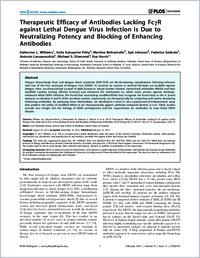Therapeutic efficacy of antibodies lacking FcγR against lethal dengue virus infection is due to neutralizing potency and blocking of enhancing antibodies
- Williams, Katherine L. Division of Infectious Diseases and Vaccinology, School of Public Health, University of California, Berkeley, California, United States of America
- Sukupolvi-Petty, Soila Departments of Medicine, Molecular Microbiology, Pathology & Immunology, Washington University School of Medicine, St. Louis, Missouri, United States of America
- Beltramello, Martina Institute for Research in Biomedicine (IRB), Faculty of Biomedical Sciences, Università della Svizzera italiana, Switzerland
- Johnson, Syd Macrogenics, Inc., Rockville, Maryland, United States of America
- Sallusto, Federica Institute for Research in Biomedicine (IRB), Faculty of Biomedical Sciences, Università della Svizzera italiana, Switzerland
- Lanzavecchia, Antonio Institute for Research in Biomedicine (IRB), Faculty of Biomedical Sciences, Università della Svizzera italiana, Switzerland
- Diamond, Michael S. Departments of Medicine, Molecular Microbiology, Pathology & Immunology, Washington University School of Medicine, St. Louis, Missouri, United States of America
- Harris, Eva Division of Infectious Diseases and Vaccinology, School of Public Health, University of California, Berkeley, California, United States of America
-
14.02.2013
Published in:
- Plos pathogens. - 2013, vol. 9, no. 2, p. e1003157
English
Dengue hemorrhagic fever and dengue shock syndrome (DHF/DSS) are life-threatening complications following infection with one of the four serotypes of dengue virus (DENV). At present, no vaccine or antiviral therapies are available against dengue. Here, we characterized a panel of eight human or mouse-human chimeric monoclonal antibodies (MAbs) and their modified variants lacking effector function and dissected the mechanism by which some protect against antibody-enhanced lethal DENV infection. We found that neutralizing modified MAbs that recognize the fusion loop or the A strand epitopes on domains II and III of the envelope protein, respectively, act therapeutically by competing with and/or displacing enhancing antibodies. By analyzing these relationships, we developed a novel in vitro suppression-of- enhancement assay that predicts the ability of modified MAbs to act therapeutically against antibody-enhanced disease in vivo. These studies provide new insight into the biology of DENV pathogenesis and the requirements for antibodies to treat lethal DENV disease.
- Language
-
- English
- Classification
- Medicine
- License
- Open access status
- gold
- Identifiers
-
- RERO DOC 326696
- DOI 10.1371/journal.ppat.1003157
- ARK ark:/12658/srd1319191
- Persistent URL
- https://n2t.net/ark:/12658/srd1319191
Statistics
Document views: 160
File downloads:
- Texte intégral: 155
